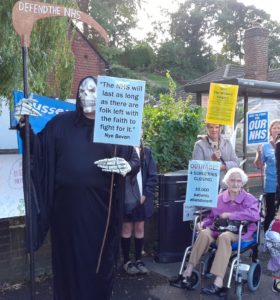Campaigners from a Brighton housing estate petitioned councillors, urging them to stop family homes from being turned into shared houses.
One of them, Bill Gandy, who chairs the Bevendean Local Action Team (LAT), painted a graphic picture of what many have called the studentification of their area.
Mr Gandy spoke out about some of the problems with shared houses – also known as HMOs (houses in multiple occupation) – at a meeting of the full council at Hove Town Hall yesterday (Thursday 20 October).
He said: “Every morning we walk past more homes that have been lost forever – replaced with overgrown gardens, piled up rubbish and recycling bins overflowing with bottles.
“We litter-pick the discarded takeaway packages left lying where they were thrown down from night and wash down the vomit from our pavements.
“We remove the fly-poster advertising the next student zombie walk, walk in the road as the pavements have been used to park the ‘unaffordable’ student cars, sweep up the smashed vodka bottles, straighten out our well-trimmed hedges that have been jumped into the night before and then make our way to work or take the children to school, all very tired and all very weary from listening to the music broadcast from the nocturnal HMO party-goers.

“As we do, we pass our doctors that used to help us with the physical and mental effects of constantly living in such conditions.
“But our surgery is fenced off and boarded up, closed just a short while ago as it has planning permission to be turned into a multi-bedroomed HMO.
“We have lost 900 family homes, our schools can no longer fill their child allocation places and our doctors’ surgery has shut its door for the last time.
“The surgery is securely fenced off with warning signs saying ‘keep out’. Is this a health and safety regulation or a warning sign issued by the HMO developer to the future of our own community?
“Our future is in your hands. You decided the very essence of our survival. Your vote will decide whether we live to rebuild our community or become displaced to make way for more HMOs.”
Mr Gandy also said: “(Our communities) are becoming increasingly polarised away from a normal mix or balance of old and young, of families and single people, of shared households, home owners, tenants or students”.
He added: “Our community is being eroded away to be dominated by one type of household – HMOs.

“While the long-term residents have been in our ward for generations, they have generated a sense of belonging, of pride and ownership of our community.
“The transient nature of the occupiers of short-term HMOs simply never develop the same pride.
“It is this very absence of these values that is gradually eroding the essence of our community away.
“We need a balance. When a community becomes unbalanced, the beneficial values of ownership, pride, caring for others, etc, gradually subside.
“We are at this point and realise that it is actually us who have become the displaced society.
“This point has an academic name. It is known as the tipping point.
“The tipping point for HMO population is exceeding 20 per cent. In our ward it is 25.4 per cent.
“The tipping point for HMO households is exceeding 10 per cent. In our ward it is 15.27 per cent
Councillor Tracey Hill leads on HMOs for the Labour administration which runs Brighton and Hove City Council. She said: “Brighton and Hove has a high number of houses in multiple occupation.
“This is due to a combination of factors including student numbers, high numbers of young people who move around frequently and high rents which mean that for many people a shared house is the only affordable way to live here.
“Our HMO licensing schemes have given us a new visibility on to the HMO market and we can see that many HMO landlords have portfolios of properties, some substantial in size.
“The management of HMOs in our city is a business, sometimes big business, and in our view should be taxed as such, just like shops, pubs, hotels and guest houses, all of which are subject to business rates.
“HMOs are a necessary part of our housing mix. But some areas are seeing huge concentrations, and this is having a negative impact on neighbourhoods.
“Not all HMOs present problems. Many are very well run and cause no problems at all. But in areas where the density is high, the problems are well documented.
“In the Lewes Road area many HMOs are student lets. Councillors hear regular reports of noise in the street, late night parties and issues with refuse and recycling and end of tenancy fly-tipping.

“Addressing private rented housing issues for both tenants and neighbours of tenants are a priority for this administration which is why I am the first ever lead councillor for the private rented sector.
“We are determined to do everything we can with the resources available. We are stepping up planning enforcement, co-operating with the universities to address street litter, fly-tipping and noise, and through the HMO Forum finding ways to enable local people to take action.
“But it all costs money and we would love to do more. Much more would be possible if we weren’t having to face the never-ending challenge of trying to do more with less.
“In terms of funding, HMOs are a double whammy for the council. While the universities and students contribute enormously to the city culturally and economically, this is not a direct contribution to the council because of students’ exemption from council tax.
“It is right that students should not pay council tax and, in theory, the council is compensated for this but in practice the grant from government is capped and the total cost to the council of exemptions is estimated at £5.4 million a year.
“Some people have responded to the idea in this notice of motion (forcing HMO landlords to pay business rates) by assuming that the additional costs to the landlord would be passed directly to the tenant.
“There is nothing inevitable about this. It’s the landlord’s decision whether to put the rent up or not.

“In fact, every measure to regulate the historically under-regulated buy-to-let sector is met with this same argument.
“The truth is that the pressure pushing rents higher and higher is not coming from regulation or tax normalisation but from ever-increasing house prices pushing up the cost of borrowing and the same thing together with severe constraints on social housing pushing people into the private rented sector because they have no other option.
“There is a chronic lack of supply. Backing away from regulation and management of the sector is not the answer. The structure of the housing market in general needs to change.
“With the proportion of private renters getting higher and higher, it is more important than ever that we have a more professional buy-to-let industry with investors coming in for the long term, prepared to pay their dues and reap a reasonable return over time.
“We need to move away from expectations of a quick buck – massive returns within one or two years which tempt some of our landlords to play fast and loose with planning regulations, pile tenants into poorly maintained properties and fail to provide a proper service.
“The government has indicated through the Housing and Planning Act that it is on board with a better managed private rented housing sector and our proposal fits with this overall ambition to professionalise the buy-to-let world.
“All we are asking for is a small contribution from HMO landlords to use to mitigate some of the effects their business is having.
“This will help HMO tenants as well as their neighbours and even out inconsistencies in terms of who pays business rates.
“It may even help to reduce some of the resistance to HMOs we are hearing about today.”

She was speaking in favour of a motion “to request that the chief executive writes to the Chancellor of the Exchequer, Secretary of State for Communities and Local Government, the chair and vice chairs of the Local Government Association and local MPs to request that councils should be given powers to bring HMO landlords within the scope of business rates in the same way as for example hotels and guest houses are within the scope of business rates.”
Councillor Andrew Wealls said that properties rented out for more than 140 days a year were already deemed to be business premises and therefore liable to business rates.
He cited the “Introduction to business rates” pages on the gov.uk website where a section headed “Self-catering and holiday let accommodation” says: “If your property is in England and available to let for 140 days or more per year, it will be rated as a self-catering property and valued for business rates.”
The same rules applied to party houses. The basic details can be found at
https://www.gov.uk/introduction-to-business-rates/self-catering-and-holiday-let-accommodation.
Councillor Joe Miller said: “We’re seeing an increasing number of HMO applications coming to the Planning Committee and finding that our hands are tied even though we often agree with those objecting to applications.”
He urged the council to toughen up its HMO policy even though they provided much-needed accommodation.
It would be better, he said, if the universities put up purpose-built and properly managed housing to meet their own needs.

Councillor Anne Meadows, who represents Moulsecoomb and Bevendean Ward, said: “Residents, particularly in Moulsecoomb and Bevendean, are concerned about the impact on their communities.”
Councillor Meadows, who chairs the council’s Housing and New Homes Committee, also touched on the consequences of businesses operating HMOs.
“Residents were rightly worried about being priced out of the city,” she said, reminding colleagues that she had long been an advocate of the need to control the proliferation of HMOs.
Councillor Clare Moonan told Mr Gandy: “You’ve put your finger on a really important issue.
“We’ve got nothing against HMOs in themselves. They’re a really important part of the housing mix.
“The problem lies in where the HMOs are and the standard of the accommodation. Poor landlords can provide sub-standard accommodation if they’re not properly regulated.”
Councillor Lee Wares expressed support although he added that he was worried about extra taxes and the effect that they would have on the rental market.

Councillor Wealls added: “The idea that this (business rates on HMOs) will not be passed on to some of the poorest residents in this city is absolutely ridiculous.”
Councillor Julie Cattell, who chairs the council’s Planning Committee, said: “The impact of HMOs on our established communities – particularly those nearest the universities – has escalated over the past few years.
“We believe we can make a strong case to government (to support this additional tax).”
Councillor Mo Marsh, who represents Moulsecoomb and Bevendean Ward, touched on the consequences of having more than 800 HMOs – about 40 per cent of all the HMOs in Brighton and Hove – concentrated in Bevendean.
She said: “School numbers are reducing worryingly.”
She was concerned about the park and added: “We want the rest of the city to take a little more of the burden.”
Councillor Daniel Yates, who also represents Moulsecoomb and Bevendean Ward, favours reviewing the rules around HMOs. He has pushed for each HMO application to be decided by the council’s Planning Committee.

He added: “People in Moulsecoomb and Bevendean understand that the Planning Committee can’t just take decisions that are not consistent with our planning policies.”
The motion was passed.










Things will never improve, just get worse.
The Green Party/Labour party relies on immature, childish selfish student brats for potential votes.
Presumably this article refers to university students and not foreign language students who also live in HMOs, some of which are also owner-occupied? On that premise, wouldn’t it be an interesting proposition to require universities (private businesses) to only accept as many students as they can provide accommodation for within their own grounds? Give yourselves a moment to let that sink in.
This revolutionary idea would mean fewer students, fewer young people would generate debts through loans, fewer houses are BTLd into HMOs and according to at least one person, less pressure on recycling plants and local hedging. All those in favour put your hands down because there’s money to be made and nobody is asking you! How will we survive without degreed cafe Nero baristas?
Why is it only now that Labour are saying that there should be Business Rates payable on HMOs they and the other Parties have allowed this situation to arise and only now that there are getting on for 40,000 studenys do they want to do something about it.I raised this issue af lrast 3 years ago and was told it wasn’t allowed.Labour in Brighton should change their colour from red to purple.
BHCC is the biggest single purchaser of the worst quality Slum HMO accommodation on offer in the city. BHCC actively sponsors slum HMOs and endorse the lowest standards as adequate .. very hypocritical to criticise decent landlords.
“The problem lies in where the HMOs are and the standard of the accommodation. Poor landlords can provide sub-standard accommodation if they’re not properly regulated.”.. so Cllr Moonan why does BHCC spend so much money on the most revolting slum, HMOs in the city to purchase “temporary, emergency” “B&B” accommodation? BHCC spends millionsof these hell holes. When BHCC accepts such dire standards of accommodation as being adequate you are being hypocritical to criticize landlords. BHCC is a slum-loving council. If it was not, it would not house people in such revolting places. Listen to ETHRAG, demand MUCH higher standards and MUCH better value.